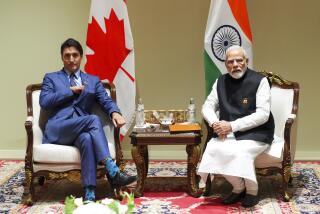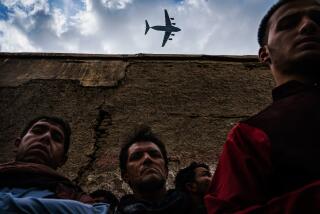Robert Gates glass house
Robert Gates, the U.S. Defense secretary, has been busy massaging wounded alliance sensibilities after telling The Times last week that NATO forces weren’t up to the task of counterinsurgency. He and other officials complained that allied troops in southern Afghanistan were relying too much on heavy firepower while avoiding joint operations with the Afghan army. Though Gates has apologized effusively and made peace, at least with Canadians, his remarks have nonetheless scarred Canadian sensitivities-particularly as Canadians debate their ongoing involvement-and left Americans believing that their country’s closest allies are not doing their fair share.
Canada has more than 10% of its army in Afghanistan and is one of the only allied nations that has on at least two occasions placed its soldiers under U.S. command. Troops have won U.S. medals and a presidential unit citation. Canadians have suffered more casualties from improvised explosive devices and combat actions relative to their small numbers, bringing into doubt U.S. officials’ assertions that allies rarely venture forth from secure bases. Indeed, one of the most tragic incidents occurred while Canadian units rushed to the aid of U.S. forces under attack in Helmand province. And so, it is not difficult to understand why hackles are raised when a country Canada considers its absolute best friend and ally forgets the sacrifice of blood and treasure.
But Gates’ comments equally fix in the mind of most Americans that only the U.S. has clearly understood the nature of the Afghan war. His apology does not recognize that most allied nations have years of peacemaking experience, and have honed their ability to operate militarily within cultural bounds. As Iraq has demonstrated to the U.S. that it must learn to fight a very different type of war, so too have its allies come to realize that the mass and firepower which were so characteristic of the Cold War have no place in the war for hearts and minds. We all realize that success is measured by the judicious use of force, in concert with economic and civil development and diplomacy. It is insincere to believe otherwise. And to peg NATO with using heavier firepower than the U.S. is to conveniently ignore the Afghan civilian deaths that have so incensed President Hamid Karzai.
It is equally incorrect to assert that allied forces in the south avoid joint operations with their Afghan army colleagues. Has the secretary not been told that the U.S. directs the training and employment of Afghan security forces? Since 2005, every political leader and military officer of any rank and status has pleaded for Afghan battalions to be sent to the south. The mantra of Canadian involvement has been to maintain an Afghan face in front of all we do, but that was next to impossible until recently, when Afghan units were finally made available. And the NATO allies in the south not only live and work in close proximity with the Afghan National Army, but have expanded this mentoring relationship to include the Afghan National Police, even paying their salaries to help advance the cause.
Gates’ remarks show that he fails to comprehend the domestic political price paid by allied leaders who have signed on to the war effort. Afghanistan has become a lightning rod of anti-American discontent by opposition parties in allied countries who see this as President Bush’s war. Although Americans, whose executive is free from imminent electoral pressure, might be inured to casualties from this conflict, each death provokes a litany of self-examination in some allied nations. In Canada, there is no more debated issue, as a special panel convened by the prime minister reported Tuesday. As a nation, we understand that we need to be present in Afghanistan for the long haul, but we require assistance, not lectures.
Finally, and possibly from a misunderstood cultural basis, American leadership in NATO consistently downplayed the threat that the Taliban represented, frequently pegging its strength as no more than 1,000 adherents and characterizing them as a spent force. As a result, the U.S. reduced its presence in southern Afghanistan, allowing the Taliban a period of respite and resurgence. The seeds of a more violent insurgency were sown long ago.
George Petrolekas is a senior officer in the Canadian military, currently on unpaid leave, and an expert in both NATO and coalition warfare in Afghanistan.
More to Read
A cure for the common opinion
Get thought-provoking perspectives with our weekly newsletter.
You may occasionally receive promotional content from the Los Angeles Times.










